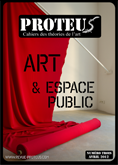Portrait de l’artiste engagé
Abstract
 Télécharger l’article
Télécharger l’article
Paru dans : Proteus n°3

Le cinéma de Jean-Luc Godard, plus particulièrement les films qu’il réalise depuis ces vingt dernières années, questionne sans relâche l’articulation de l’art à la communication, au politique et à l’économique. Depuis les Histoire(s) du cinéma jusqu’à Film Socialisme , sont interrogés le régime esthétique de l’art, la nécessité pour l’art de résister à la captation de l’œuvre devenue marchandise et les paradoxes d’une Europe dont la liberté reconquise peut aussi sonner le glas de la pensée, de l’autonomie des peuples et de l’intégrité de l’art. Cependant, cette exploration de la puissance ou de l’impuissance politique de l’art émane d’un cinéaste dont la posture et l’énonciation solitaires, inscrites dans les marges des institutions, induisent le risque de l’incommunication d’une pensée critique dont le medium cinématographique est pourtant l’un des grands témoins de notre temps.
Mots-clés : document — fiction — engagement — émancipation — Adorno
The cinematographic work of Jean-Luc Godard, more specifically the films he made the last twenty years, examined tirelessly the articulation between art and communication, politics and economy. From Histoire(s) du cinema to Film Socialisme , the aesthetic regime of art has been questioned, as well as the commoditisation of the artwork and the need to fight against this process. Moreover, the regained freedom of Europe can paradoxically sound the death knell for the thought, the self-determination of Peoples and the integrity of art. However, this exploration of the political power or powerless of art comes from a film-maker whose solitary attitude and enouncing, inscribed in the margins of institutions, create the risk of the non-communication of a critical thinking given by the cinema as a medium, even though the cinematographic art is one of the major witnesses of our time.
Keywords : document — fiction — engagement — emancipation — Adorno








